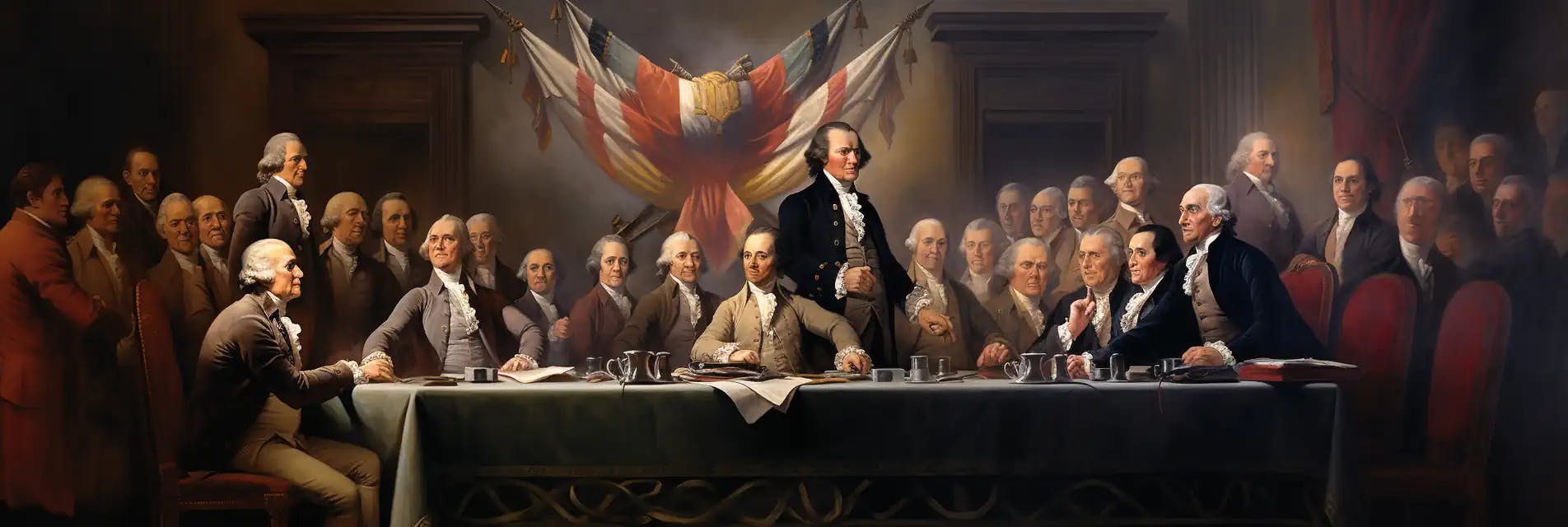I'm shifting into law and politics for a moment, and I'll probably lose a bunch of subscribers, but those who hold on to the end will see it all come back to next-generation decentralized blockchain-based ebook formats.
Fourteenth Amendment Section 3:
"No person shall be a Senator or Representative in Congress, or elector of President and Vice-President, or hold any office, civil or military, under the United States, or under any State, who, having previously taken an oath, as a member of Congress, or as an officer of the United States, or as a member of any State legislature, or as an executive or judicial officer of any State, to support the Constitution of the United States, shall have engaged in insurrection or rebellion against the same, or given aid or comfort to the enemies thereof. But Congress may by a vote of two-thirds of each House, remove such disability."
Ratified in 1868, in the wake of the Civil War, the Fourteenth Amendment to the U.S. Constitution has had an enduring effect on citizenship rights, due process, and equal protection under the law. But its Section 3 Disqualification Clause, intended to keep power out of the hands of insurrectionist officeholders, has been rendered dormant for over a century.
But with the January 6, 2021, attack on the Capitol, this long-sleeping clause has opened its eyes, cracked its neck, and brewed up a big pot of coffee.
Several Disqualification Clause cases have been brought by Republican voters and candidates challenging the appearance of Donald Trump’s name on the Republican Primary Election ballot.
A Modern Insurrection?
Do the events of January 6th count as an insurrection under the Disqualification Clause? If so, does Donald Trump’s involvement rise to the level of engagement? Courts in most states have found several ways to side-step these questions.
In Minnesota, the court in Growe et al v. Simon said the definitions of insurrection and insurrectionist are inherently political and best determined by Congress.
A Michigan case, LaBrant et al. v. Benson, found the issue to be premature, as the purpose of a primary is not to determine the next president, but to determine party delegates to a political party’s national convention where a presidential nominee will be chosen.
An Arizona case, Castro v. Fontes, found that the plaintiff, Republican presidential candidate John Anthony Castro, lacked standing to raise the issue because he’d hardly be a contender even with Donald Trump removed from the ballot. Ouch.
So far, only one state-level Disqualification Clause case has passed through the thresholds of jurisdiction, ripeness, and standing to apply the law to the facts of January 6.
Anderson et al. v. Griswold
Last month, a Colorado district court in the case of Anderson et al. v. Griswold found that January 6 was an insurrection and that Donald Trump is an insurrectionist against the Constitution of the United States as defined by the Fourteenth Amendment.
However, by a quick check of the wording reproduced above, the Fourteenth Amendment doesn’t disqualify all insurrectionists from office, only the subset of insurrectionists who are oath-breakers.
Jacob Chansley, the so-called QAnon Shaman who stormed through the Capitol in a horned helmet and face paint, is the first person many people think of when they picture a January 6 insurrectionist. But since Chansley had not previously sworn an oath to support the Constitution, he is free to run for office and is in fact currently seeking to represent Arizona’s 8th Congressional District.
On January 20, 2017, Donald Trump swore an oath to “protect, preserve, and defend” the Constitution—but not to “support” it, as the mandated presidential oath differs in its wording from all other governmental and military oaths.
Since the Fourteenth Amendment uses “support,” there’s ambiguity as to whether that specific word is a required element of a Disqualification Clause oath or whether support can be inferred to be included in the spirit of the more stringent words required for an even more responsible office.
The Anderson court resolved the ambiguity by proposing an additional class of individuals who aren’t subject to the Disqualification Clause: U.S. Presidents who had not previously sworn the “supportive” oath in other governmental offices or in the military.
This exception is so narrow that it would only apply to Donald Trump and arguably to George Washington, whose military service predated the Constitution.
But even if the Anderson court had found the Disqualification Clause applicable to Trump, the court came down on Trump’s side of a second ambiguity: whether the framers of the Fourteenth Amendment intended the Disqualification Clause to bar insurrectionists from subsequent service in all public offices or only from public offices that aren’t President and Vice President.
Those two offices aren’t explicitly called out in the amendment, and the Anderson court wasn’t persuaded that they fell into the catch-all category of “officer of the United States.”
Live from Denver...
Anderson et al. v. Griswold is headed to the Colorado Supreme Court, the Mile-High Courthouse, where oral arguments are happening today! The stream can be viewed on the American Justice Project’s 14A3 page at 1PM Denver time (3PM for those of us on the East Coast).
The Anderson Petitioners will be asking the Court to overturn the two interpretations of the Disqualification Clause that are currently keeping Trump, specifically, on the Colorado Republican Primary ballot.
Trump, through his lawyers, will ask the Court to remove the stigma of the factual determinations regarding his participation in an insurrection, to invalidate the admissibility of the January 6th Committee Report as evidence, and to replicate the Growe court’s ruling that only Congress can determine when the Disqualification Clause applies to defining and event as an insurrection.
Onward to the Supreme Court?
Because of the novel constitutional issues involved, it seems inevitable that these issues will ultimately be kicked upward to the U.S. Supreme Court, where Trump will have the advantage.
For the Petitioners to successfully disqualify Trump from the ballot, they will have to prevail on every procedural, factual, and legal issue. Meanwhile, Trump has thrown multiple strands of argument against the wall and will prevail if any one of them manages to stick.
Regardless of the outcome, Anderson and the other Disqualification Clause cases will clarify some gray areas of constitutional law, rewrite legal textbooks, impact the upcoming election, and compound Trump’s other ongoing legal woes.
The Web3 Connection
During the stream, I’ll be giving away blockchain-bound mementos of this case. These collectibles are fascinating to read and provide long-term decentralized preservation of these important historical documents, each embedded in a decentralized reader app.

This newsletter you're reading is also a collectible, and those who collect a copy will be airdropped a bonus from the American Justice collection.

